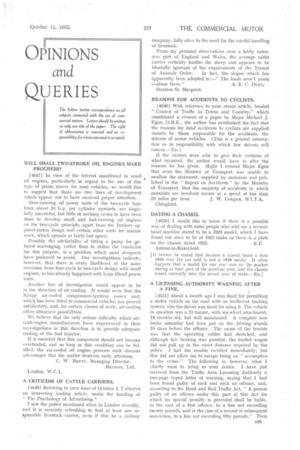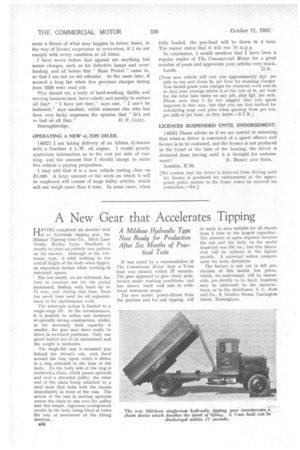OPINIONS
Page 43

Page 44

If you've noticed an error in this article please click here to report it so we can fix it.
and
QUERIES
The Editor invites correspondence on all subjects connected with the use of commercial motors. Letters should be written on only one side of the paper. The right of abbreviation is reserved and no responsibility for views expressed is accepted.
WILL SMALL TWO-STROKE PROGRESS? OIL ENGINES MAKE [4647] In view of the interest manifested in small oil engines, particularly in regard to the use of this type of prime mover for road vehicles, we would like to suggest that there are two lines of development which appear not to have received proper attention.
Slow-running oil power units of the two-cycle type from about 20 h.p. per cylinder upwards, are singularly successful, but little or nothing seems to have been done to develop small and fast-running oil engines on the two-cycle principle, apart from the Junkers opposed-piston design and certain other units for marine work, which operate at fairly low speed.
Possibly the advisability of fitting a pump for wchatist scavenging, rather than to utilize the crankcase for this purpose, is a problem which most designers have preferred to avoid. Our investigations indicate, however, that there is every likelihood of the same reversion from four-cycle to two-cycle design with small engines, as has already happened with large Diesol power units, Another line, of investigation would appear to be in the direction of air-cooling. It would seem that the Krupp air-cooled compression-ignition power unit, which has been fitted to commercial vehicles, has proved satisfactory, and, for certain classes of work, air-cooling offers attractive possibilities.
We believe that the only serious difficulty which aircraft-engine manufacturers have experienced in their investigations in this direction is to provide adequate cooling of the fuel injector.
It is essential that this component should not become overheated, and so long as this condition can be fulfilled, the air-cooled oil engine presents such obvious advantages that the matter deserves early attention.
C. W. BRETT, Managing Director, Barimar, Ltd. London, W.C.1.
A CRITICISM OF CATTLE CARRIERS.
[4648] Referring to your issue of October 4, I observe an interesting leading article, under the heading of "The Psychology of Advertising."
I saw the poster mentioned when in London recently, and it is certainly refreshing to find at least one responsible livestock carrier, even if this be a railway company, fully alive to the need for the careful handling of livestock.
From ray personal observations over a fairly extensive part of England and Wales, the average cattle carrier certainly hustles the sheep and appears to be blissfully ignorant of the requirements of the Transit of Animals Order. In fact, the slogan which has apparently been adopted is :--" The loads aren't yours —abuse them." A. E. C. DENT. Stratton St. Margaret.
REASONS FOR ACCIDENTS TO CYCLISTS.
[4649] With reference to your recent article, headed "Control of Traffic in Towns and Country," • which constituted a resume of a paper by Major Michael J. Egan, 0.B.E., the author has overlooked the fact that the reasons for fatal accidents to cyclists are supplied mainly by those responsible for the accidents, the drivers of motor vehicles. [This is a general assumption as to responsibility with which few drivers will concur.—En.] If the victims were able to give their versions of what occurred, the author would have to alter the reasons he has given. Might I remind Major Egan that even the Minister of Transport was unable to swallow the statement, supplied by motorists and published in the "Report on Accidents" by the Ministry of Transport, that the majority of accidents in which motorists are involved occurs at a speed of less than 20 miles per hour. J. W. Cos,psR, Chingford.
DATING A CHASSIS.
[4650] I would like to know if there is a possible way of dealing with some people who sold me a secondhand machine stated to be a 1926 model, which I have found out since to be of 1925 make as there is plate on the chassis dated 1925. E.P. Ashton-in-Makerfield.
[It cannot be stated that because a chassis bears a date 1925 that the car sold is not a 1926 model. It often happens that a model for one year was on the market during at least part of the previous year, and the chassis would naturally bear the actual year of make.--ED,j
A LICENSING AUTHORITY WARNING AFTER A FINE.
[4651] About a month ago I was fined for permitting a motor vehicle on the road with an inefficient braking system, also the driver was fined for using it. The vehicle in question was a 2i-tonner, with six-wheel attachment, 18 months old, but well maintained. A complete new brake assembly had been put on the driving wheels 10 days before the offence, The cause of the trouble was that the operating cables had stretched, and although fair braking was possible, the loaded wagon did not pull up in the exact distance required by the police. I had the trouble rectified immediately, but this did not allow me to escape being an " accomplice to the crime." The following is, however, what I chiefly want to bring to your notice. I have just received from the Traffic Area Licensing Authority a two-page typed letter of warning, saying that I had been found guilty of such and such an offence, and, according to the Road and Rail Traffic Act, "A person guilty of an offence under this part of this Act for which no special penalty is provided shall be liable, in the case of a first offence, to a fine not exceeding twenty pounds, and in the case of a second or subsequent conviction, to a fine not exceeding fifty pounds." Then came a threat of what may happen in future times, in the way of licence suspension or revocation, if I do not comply with every condition at all times.
I have never before had against me anything but minor charges, such as for defective lamps and overloading. and all before this " Basic Period" came in, so that I am not an old offender. At the same time, it seemed a long list when five previous charges dating from 1928 were read out.
Why should we, a body of hard-working, thrifty and striving business men, have calmly and meekly to endure all this? " I have not time," says one, " I can't be bothered," says another, whilst someone else who has been very lucky expresses the opinion that "It's not so bad as all that." D. F. aiFr. Boroughbridge.
OPERATING A NEW 41-TON OILER.
[4652] I am taking delivery of an Albion 4i-tonner with a Gardner 4 L.W. oil engine. I would greatly appreciate information as to the cost per mile of running, and the amount that I should charge to make this vehicle a paying proposition.
may add that it is a new vehicle costing close on £1,000. A large amount of the work on which it will be employed will consist of large bulky articles, which will not weigh more than 6 tons. In some cases, when fully loaded, the pay-load will be down to 4 tons. The maker states that it will run 18 m.p.g.
In conclusion, I would mention that I have been a regular reader of The Commercial Motor for a great number of years and appreciate your articles very much.
Leeds. D.N.
[Your new vehicle will cost you approximately Sid. per mile to run and about 2s. per hour for standing charges. You should grade your charges for whatever work you do so that your average return is at the rate of 4s. per hour for the total time taken on any job, plus 30. per mile. Please note that I do not suggest that you quote inquirers in that way, but that you use that method for calculating your own price when quoting them per ton, per mile or per hour, as they desire.—S.T.R.]
LICENCES SUSPENDED UNTIL ENDORSEMENT.
[4653] Please advise us if we are correct in assuming,. that when driver is convicted of a speed offence and licence is to be endorsed, and the licence is not produced at the Court at the time of the hearing, the driver is debarred from driving until it is brought for endorse ment? E. BERRY AND SONS. London, E.16.
[We confirm that the driver is debarred from driving until his licence is produced for endorsement at the appropriate police station to the Court where he received his conviction.—En




























































































